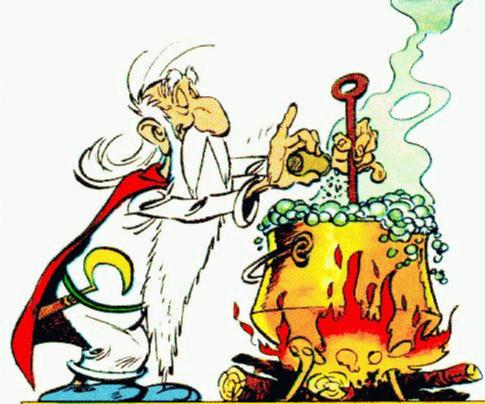The druids: Britain's native philosophers?

The latest episode of In Our Time is a particularly good one. Melvyn Bragg gathers three contemporary scholars of Druidism, who reveal some fascinating stuff about the druids. We find out, for example, that when the Romans encountered the druids, after their invasion of Britain and Gaul in the first century BC, they were very impressed with them and thought of them as natural philosophers in the mould of Pythagoras - both the druids and Pythagoras believed in the transmigration of souls, apparently.
Like the Greek philosopher-shamans of the 6th and 5th centuries BC, druids combined the role of fortune-tellers, priests, doctors, judges, poets and chieftans. And, like Pythagoreans, they didn't write down their doctrine, instead preserving it as a secret oral tradition. This gave them great power over their societies, as the sole keepers of their tribe's cultural DNA, and the exclusive intermediaries with the gods.
We hear of a fascinating meeting in Rome between Cicero, the great Roman politician, philosopher and lawyer, and a Gallic druid called Divitiacus. Cicero apparently came away impressed by the druid's ability to tell the future.
Britain's native philosophical tradition (if we can call it that) was wiped out when the the Romans invaded Anglesey in 60 AD. According to Tacitus, the druids lined up on the beaches and terrified the approaching Roman soldiers with the curses they hurled down on them.
But the curses didn't work, the druids were massacred, and all our native philosophical culture was lost. In place of the druids' secret oral culture and deeply hierarchical society, Britain became subsumed under the Pax Romana, Rome's written culture of law and rationality. The sacred groves of the druids were bull-dozed by the great stone roads of the Roman Empire. Divitiacus died and Ciceronian law reigned supreme.
Ever since, there has been a tendency in British culture to bewail the loss of the druids and of our native bardic magical tradition. The Romantics, in particular, rebelled against the scientific rationalism of the modern world by harking back, in a rather fey way, to the mysticism of the druids - that wonderful era when the shaman-poets were listened to, respected, when they wielded terrible power over their society. Ted Hughes, WB Yeats and Robert Graves all liked to think of themselves as in the druidic tradition. You still come across that sort of nostalgia for the druids today - think of the magus-cartoonist Alan Moore, or all those wicca-worshippers who dance around Stonehenge every solstice.
But I for one don't think we can give in to nostalgia for the druids, and I think that nostalgia is an example of the sort of reactionary conservatism and irrationalism that has blighted the arts and humanities ever since Romanticism.
The druids claimed magical powers that they didn't have. They used the ignorance and illiteracy of their populations to lord it over them. They could have tried to educate their people, but that would have reduced their power. They could have written down their ideas and let others debate them, but that would be to put their claims to rational test, which again would have reduced their power.

That power included, by the way, sacrificing other humans to tell the future. The Romans were horrified by this barbaric practice, and used it in their propaganda for the invasion of Britain. The Romans themselves only stopped human sacrifices a few decades before the invasion, but still, they were right to be appalled. Thank God we're not under the power of such people any more.
In countries where education, literacy and scientific understanding is much lower - like much of Sub-Saharan Africa - you still see instances of witch-doctors ritually killing people, even children, for their 'healing remedies' or other forms of magic. And you also see a fascination with blood-magic in some western nostalgists for the druids, like Alan Moore (who likes to think of himself as a magician).
Moore's graphic novel From Hell, for example, suggests that Jack the Ripper somehow manages to travel through time thanks to his horrific ritualistic murder of prostitutes. How fucked up is that! What is Alan Moore saying - that people can wield incredible magical power by human sacrifice? And he calls himself a democrat...He's a reactionary, a deeply conservative and irrationalist reactionary.
The druidic culture, like that of Pythagoras, was elitist, anti-democratic, hierarchical, and obscurantist. As Carl Sagan pointed out in his critique of Pythagoras, the power of such magi depended on the ignorance, superstition and fear of the people. They sacrificed humans to their lies. Roman culture, by contrast, was based on reason, on debate, on democracy, on mass literacy. It helped create the ground for the scientific revolution, which finally cleared away the obscurantist mist of the druids and took away their power over us (except in Ireland, alas, where the priests still tyrannize the people). How dare they claim they were the sole intermediaries with the gods? Priests have always tried to pull that trick - and they've often resisted the growth of mass education and literacy (with the exception of the Quakers, who believed we could all access God ourselves, without the need for a priest-caste).
So, much as I love my country, and much as I love the native tradition of bardic poetry here, I'm afraid I'm glad the Romans landed at Anglesey and massacred the druids. Sorry Getafix.
